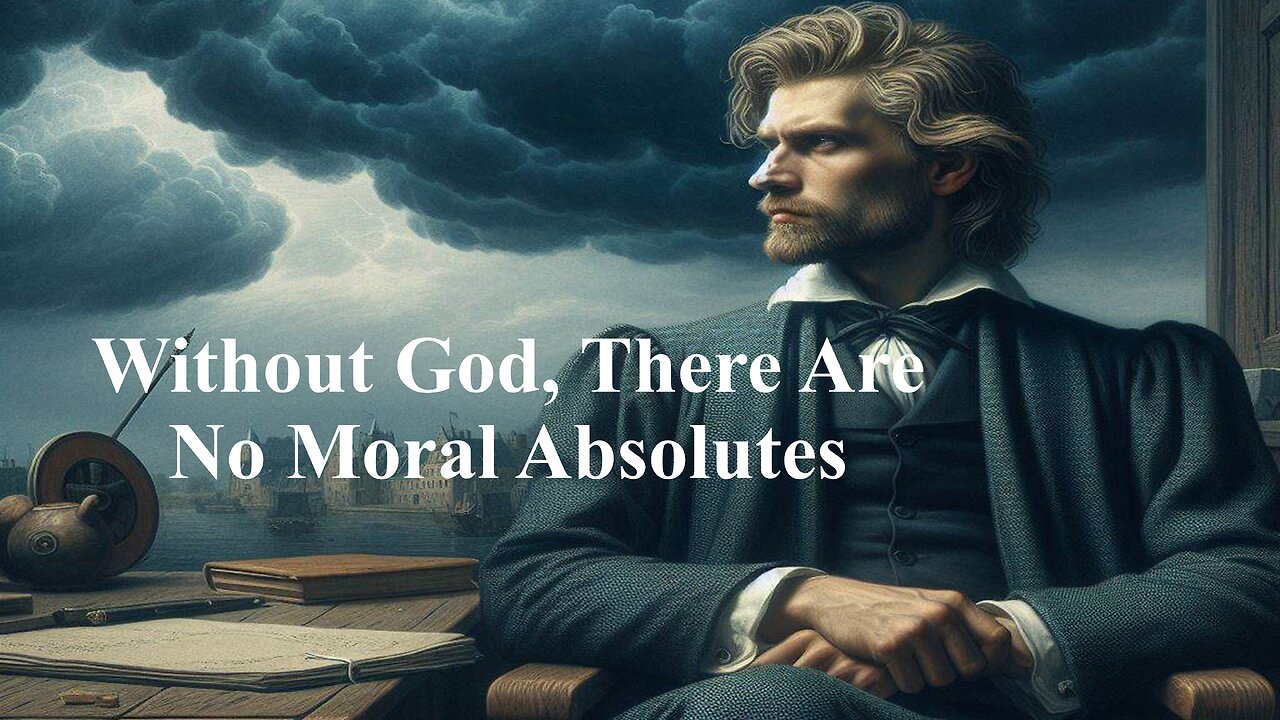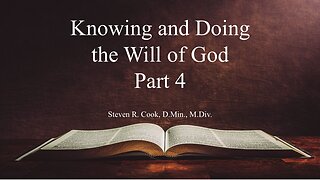Premium Only Content

Without God, There Are No Moral Absolutes
Humanism rejects God and His revelation and places mankind at the center of morality and meaning. Francis Schaeffer explains humanism as “Man beginning from himself, with no knowledge except what he himself can discover and no standards outside of himself. In this view Man is the measure of all things, as the Enlightenment expressed it.” (Francis A. Schaeffer, A Christian Manifesto, 24)
But atheism creates a problem concerning moral absolutes, for if there is no God, then there is no moral absolute Law-giver; and if there is no moral absolute Law-giver, then there are no moral absolutes, and we are left to conclude that what is, is right, and any further discussion about right and wrong becomes nothing more than opinion.
Francis Schaeffer is correct when he states, “If there is no absolute moral standard, then one cannot say in a final sense that anything is right or wrong. By absolute we mean that which always applies, that which provides a final or ultimate standard. There must be an absolute if there are to be morals, and there must be an absolute if there are to be real values. If there is no absolute beyond man’s ideas, then there is no final appeal to judge between individuals and groups whose moral judgments conflict. We are merely left with conflicting opinions.” (Francis A. Schaeffer, How Should We Then Live?: The Rise and Decline of Western Thought and Culture, 145)
Those who reject God are left to create and impose arbitrary values on others, and the tyrants of the world are glad to bully and control others by means of strong arm tactics, whether social intimidation, economic coercion, or brute physical force. The only objective standard for measuring righteousness or guilt is set forth in God’s Word which defines reality. The Bible reveals God is “the Judge of all the earth” (Gen 18:25), and He “is a righteous judge” (Psa 7:11), and He “judges righteously” (Jer 11:20), and “will by no means leave the guilty unpunished” (Ex 34:7). Yet, the Bible also reveals God is “merciful and gracious, slow to anger and abundant in lovingkindness and truth” (Psa 86:15), and One “Who pardons all your iniquities” (Psa 103:3), when we come to Him in honesty and humility. And for those who come to Him in humility, who are like the tax collector, who “was even unwilling to lift up his eyes to heaven, but was beating his breast, saying, ‘God, be merciful to me, the sinner!’” (Luke 18:13), will find Him to be merciful. For those of us who trust in Christ as Savior, we are blessed with “forgiveness of sins” (Eph 1:7; cf., Acts 10:43), the “gift of righteousness” (Rom 5:17; cf., 2 Cor 5:21; Phil 3:9), “eternal life” (John 10:28), and become “children of God” (John 1:12), with a promise that we will spend eternity in heaven with Him (John 14:1-3). J. Dwight Pentecost notes, “If you should be without Jesus Christ as your personal Savior, you stand guilty before God because you are still in Adam’s race. Even though Christ bore that sin, it means nothing to you until you are related to Him by faith. The righteousness of Christ cannot be imputed to you unless you personally receive Jesus Christ as your Savior.” (J. Dwight Pentecost, Things Which Become Sound Doctrine, 48). If you have not yet trusted in Christ as your Savior, then I “beg you on behalf of Christ, be reconciled to God” (2 Cor 5:20).
-
 1:12:59
1:12:59
Thinking on Scripture
3 days agoKnowing and Doing the Will of God - Part 4
91 -
 LIVE
LIVE
Wendy Bell Radio
6 hours agoTrump Cracks The Barrel
7,866 watching -
 LIVE
LIVE
The Big Mig™
2 hours ago2020 Election Fraud Burn Bags Discovered
2,977 watching -
 LIVE
LIVE
Law&Crime
1 hour agoLIVE: Adelson Matriarch Murder Trial — FL v. Donna Adelson — Day 4
171 watching -
 LIVE
LIVE
Badlands Media
10 hours agoBadlands Daily: August 27, 2025
3,647 watching -
 LIVE
LIVE
The State of Freedom
4 hours agoFLF: #15 Obedience to God Unlocks Mysteries & Brings Adventure w/ Dave Hayes
21 watching -
 1:03:42
1:03:42
Crypto Power Hour
2 hours agoWhat Coins Are The Backbone of The New Digital Revolution?
6.36K6 -
 1:22:55
1:22:55
Game On!
19 hours ago $2.62 earnedBREAKING NFL NEWS: Taylor Swift and Travis Kelce Are Engaged!
39.3K13 -
 41:04
41:04
Coin Stories with Natalie Brunell
1 day agoCooking, Culture & Crypto: Norma Chu’s Food Empire Turns Bitcoin Treasury
35.4K -
 LIVE
LIVE
JuicyJohns
2 hours ago $0.15 earned🟢#1 REBIRTH PLAYER 10.2+ KD🟢
25 watching